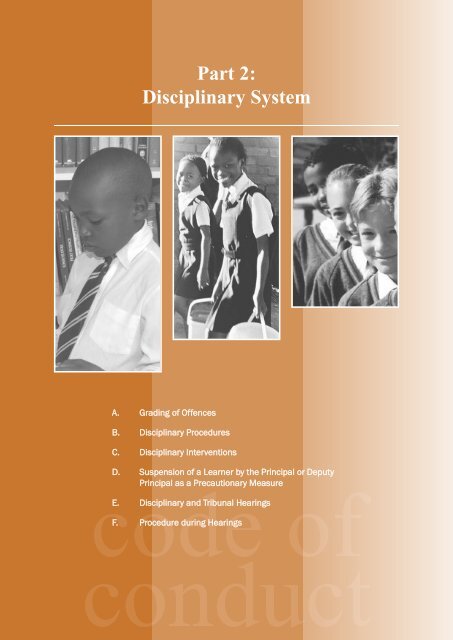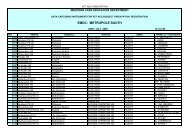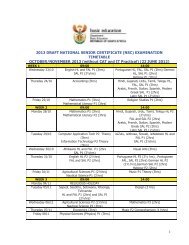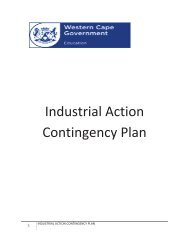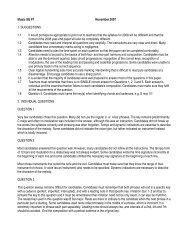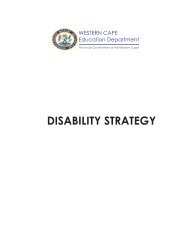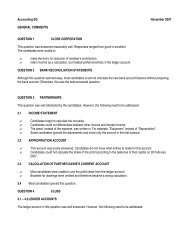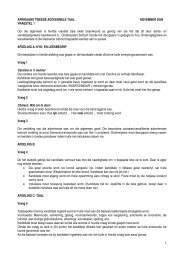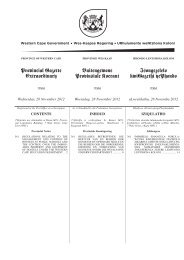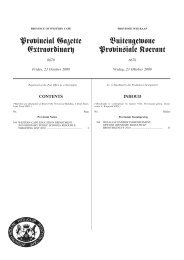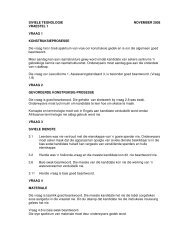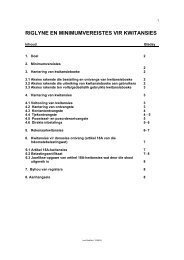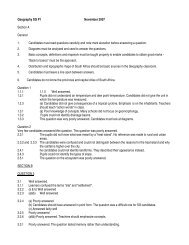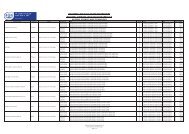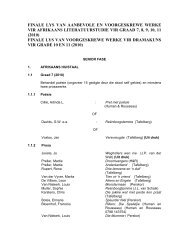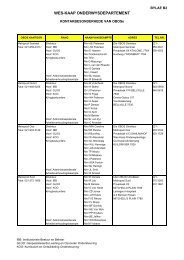Part 2: Disciplinary System
Part 2: Disciplinary System
Part 2: Disciplinary System
- No tags were found...
You also want an ePaper? Increase the reach of your titles
YUMPU automatically turns print PDFs into web optimized ePapers that Google loves.
<strong>Part</strong> 2:<strong>Disciplinary</strong> <strong>System</strong>A. Grading of OffencesB. <strong>Disciplinary</strong> ProceduresC. <strong>Disciplinary</strong> InterventionsD. Suspension of a Learner by the Principal or DeputyPrincipal as a Precautionary MeasureE. <strong>Disciplinary</strong> and Tribunal HearingsF. Procedure during Hearings
2Every<strong>Part</strong> 2: <strong>Disciplinary</strong> <strong>System</strong>teacher is responsible for discipline and has the full authority andresponsibility to correct the behaviour of learners whenever such correction isnecessary. Any corrective measure or disciplinary action will correspond with andbe appropriate to the offence.All learners will abide by the discipline system that has been developed to assistand guide learner behaviour in the School.A. Grading of OffencesOffences are graded according to the nature and degree of seriousness of theoffences, of which Grade 4 offences are the most serious. See Annexure B, Table1 for a list of the offences making up each of the Grades 1, 2, 3 and 4.B. <strong>Disciplinary</strong> ProceduresThe grade of an offence will determine the procedure to be followed.1. Grade 1 offence – a written warning followed by a final written warning, thena disciplinary hearing.2. Grade 2 offence – a final written warning followed by a disciplinary hearing,then a tribunal hearing.3. Grade 3 offence – a disciplinary hearing or a tribunal hearing (depending onthe severity of the particular offence).4. Grade 4 offence – offence immediately reported to the South African PoliceService (SAPS) and a tribunal hearing.Grade 1:OffencesAll Grade 1 offences will be dealt with by the staff member or RCL member/prefectconcerned who must keep a written record of such offences and the disciplinarymeasure taken.When a third Grade 1 offence occurs, the matter is referred to the Grade Headalong with the record of all three (3) offences and the Grade Head will issue awritten warning. A signed copy of acknowledgement will be kept on record by theGrade Head and communicated to the parent/guardian.12 Example of a Code of Conduct for a School
Should the particular Grade 1 offence recur after disciplinary intervention hasoccurred and a written warning has been issued, the staff member will, inconsultation with the Grade Head, arrange an interview with the learner. A finalwritten warning will be issued. A signed copy of acknowledgement will be kept onrecord by the Grade Head and communicated to the parent/guardian.The Grade Head will keep on record copies of all relevant documentation relatingto the offences and the disciplinary measures imposed and provide copies thereofto the learner’s register teacher.Grade 2:OffencesAll Grade 2 offences will immediately be referred to the Grade Head. The staffmember will, in consultation with the Grade Head, arrange an interview with thelearner. A final written warning will be issued and disciplinary action applied. Asigned copy of acknowledgement will be kept on record by the Grade Head andcommunicated to the parent/guardian.When a second Grade 2 offence occurs after a final written warning has beenissued for the first offence, the Grade Head will refer the matter to the <strong>Disciplinary</strong>Committee for a disciplinary hearing. The parent/guardian will be advised inwriting, a minimum of five (5) days before the designated date, that an internaldisciplinary hearing has been convened.Should the particular Grade 2 offence recur after the issuing of a final writtenwarning and a disciplinary hearing has occurred, the <strong>Disciplinary</strong> Committee willrefer the matter to a tribunal hearing. The parent/guardian will be advised inwriting, a minimum of five (5) days before the designated date that a tribunalhearing has been convened.The Grade Head will keep on record copies of all relevant documentation relatingto the offences and the disciplinary measures imposed and provide copies thereofto the learner’s register teacher.Grade 3:OffencesAll Grade 3 offences will immediately be reported to the Grade Head. The GradeHead will refer the matter to the <strong>Disciplinary</strong> Committee who will, depending onthe severity of the offence, determine whether to convene a disciplinary hearing ora tribunal hearing. The parent/guardian will be advised in writing, a minimum offive (5) days before the designated date that a hearing has been convened.Example of a Code of Conduct for a School 13
Grade 4:OffencesAll Grade 4 offences will immediately be reported to the Grade Head. The GradeHead will refer the matter to the School Principal who will immediately file a reportwith the SAPS and convene a tribunal hearing. The parent/guardian will beinformed immediately of the offence and be advised in writing, a minimum of five(5) days before the designated date that a hearing has been convened.C. <strong>Disciplinary</strong> Interventions1. The following list of interventions and corrective measures used by the Schoolare aimed at correcting behaviour before suspension and expulsion:• A verbal warning/reprimand to express disapproval.• Written warning.• Final written warning.• Removal from classes to the exclusion room.• Written punishment.• Community service to improve the physical environment within and aroundthe School property.• Homework detention.• Supervised schoolwork.• De-merit detention.• Referral for counselling.• Attendance of a relevant life skills programme.• Fines to compensate for damages, to cover the cost of repair orreplacement of the lost or damaged item, and/or the accumulated fine.• Temporary suspension of library card and/or other School-relatedprivileges• Exclusion from School activities and functions, e.g. academic awardceremony.• Withdrawal of recognition, e.g. award.• Temporary suspension from class or School, pending disciplinary hearing.• <strong>Disciplinary</strong> hearing.• Tribunal hearing.2. Failure to comply with interventions and corrective measures will lead tofurther interventions and may lead to the offence being categorised at a highergrade. Expulsion may be recommended for a Grade 3 and a Grade 4 offence.See Annexure B, Table 2 for a list of the possible disciplinary measures to beapplied for Grade 1, 2, 3 and 4 offences respectively.14 Example of a Code of Conduct for a School
3. Conduct that may lead to suspension/exclusion includes, but is not limited to,the following:• Conduct that violates the rights or safety of others.• Criminal behaviour of any kind.• Defacing or destroying School property.• Disrespectful or objectionable conduct and verbal abuse directed atteachers, other School employees or fellow learners.• Outright defiance of lawful requests or instructions issued by persons inauthority.• Indulging in harmful graffiti, racism or “hate speech”.• Sexual harassment or sexual assault.• Immoral behaviour or profanity.• Possessing, using or displaying evidence of use of any narcotics,unauthorised drugs, alcohol or any other intoxicant.• Repeated infringements of the School rules or the Code of Conduct.• Possession of dangerous weapons (guns, knives and other objects whichmay threaten the lives of learners/teachers).4. Should a learner be found guilty by a court of law for breaking the law of theRepublic of South Africa, the School has the right, after a fair hearing throughthe Governing Body, to recommend expulsion to the Provincial Department ofEducation.5. A tribunal hearing will be convened with a view to recommending expulsion. Insuch instances the recommendation for expulsion will be submitted to theProvincial Head of Education to approve the decision.6. Where approval for expulsion is not granted, learners will attend counselling orthe relevant life skills programme before they may return to class. Suchlearners will be accommodated in the exclusion room in the interim to continuewith schoolwork until they have completed the series of counselling sessionsor the stipulated life skills programme.D. Suspension of a Learner by the Principal or Deputy Principal as a PrecautionaryMeasureThe Governing Body authorises the Principal or Deputy Principals to institutesuspension, as a precautionary measure, with regard to a learner who is chargedwith a serous misconduct offence as contemplated in section 8 of the SA SchoolsAct.Example of a Code of Conduct for a School15
1. Before a learner is suspended, the learner and his/her parents must be givenan opportunity to indicate why the suspension should not be considered.2. The disciplinary proceedings must commence within one (1) week after thesuspension. If the proceedings do not commence within one (1) week, approvalfor the continuation of the suspension must be obtained from the Head ofDepartment.3. This suspension will be applicable until a finding of not guilty is made or, inthe case of a finding of guilty, until the appropriate sanction is announced.E. <strong>Disciplinary</strong> and Tribunal Hearings1. The following official forms will be used for misconduct and disciplinaryhearings:1.1 Written warning (disciplinary warning form) (Annexure C)1.2 Final written warning (Annexure D)1.3 Notice of disciplinary hearing (Annexure E)1.4 Record of disciplinary hearing (Annexure F)1.5 Review form (lodging of appeal) (Annexure G)2. Written notice of a disciplinary or tribunal hearing will be given at least five (5)School days before the hearing, which could imply temporary suspension fromclasses, excluding formal scheduled tests and examinations which counttowards the year mark.3. When a notice is issued to a learner the learner must acknowledge receipt ofnotice by signing for it. This is not an admission of guilt.4. If a learner does not appear at a hearing, the hearing will be conducted inhis/her absence.5. A written verdict of the hearing will be issued to the offender. The offendermust acknowledge the content by signing the document.6. A learner has the right to request a review of the disciplinary action takenagainst him/her if sufficient grounds exist. Disregard of punishment of the<strong>Disciplinary</strong> Committee will lead to temporary suspension pending a hearing.7. The <strong>Disciplinary</strong> Hearing Commission will consist of the following members:7.1 a Governing Body representative;7.2 the School Principal or Discipline Officer delegated to oversee thisfunction;7.3 the Grade Head; and7.4 the register teacher.16 Example of a Code of Conduct for a School
8. The hearing will also be attended by the learner, and any other learner s/hemay need for his/her defence.9. <strong>Disciplinary</strong> measures that a <strong>Disciplinary</strong> Hearing Committee may imposeinclude:9.1 Demerits.9.2 Suspension from School for a minimum of two days up to a maximum offive (5) days, ratified by the Governing Body, to be effective immediately.This will be put in writing and a copy kept on record.9.3 Recommendation with respect to counselling/attendance of a life skillsprogramme.9.4 Progress monitoring process initiated for a minimum of two (2) weeks,followed up with a progress report.9.5 A written conduct and behaviour warning issued. A signed copy ofacknowledgement will be kept on record.9.6 Payment to cover the cost of repair or replacement of the damaged, lostor stolen item.10. The Tribunal Hearing Commission will consist of the following members:10.1 the Governing Body Chairperson;10.2 two (2) parent representatives from the Governing Body;10.3 the School Principal or Discipline Officer delegated to oversee thisfunction; and10.4 the Grade Head.11. The Principal/Discipline Officer will keep on record copies of all documentationrelating to the offence, the conducting and findings of the hearing, and thedisciplinary measures imposed.12. The Principal/Discipline Officer will furnish the relevant Grade Head andregister teacher with all the information necessary for their records.F. Procedure during Hearings1. The Chairperson of The Committee must lead the proceedings and:• Introduce those present and state their functions.• Ensure that witnesses are present only while giving their evidence.2. The Chairperson must inform the learner of his/her rights:Example of a Code of Conduct for a School17
• The right to a formal hearing.• The right to be present at the hearing.• The right to be given time to prepare for the hearing case.• The right to be given advance notice of the charges.• The right to be represented at the hearing by one (1) internalrepresentative.• The right to be accompanied at the hearing by parents/guardian if thelearner is a minor.• The right to ask questions on any evidence produced, or on statements ofwitnesses.• The right to call witnesses to testify on his/her behalf.• The right to an interpreter, to be requested 24 hours prior to the hearing.• The right to appeal within five (5) days against any penalty imposed by the<strong>Disciplinary</strong> Committee.• If the learner does not attend, the hearing will be conducted in his/herabsence.3. The Chairperson is to explain the nature of the alleged breach or misconductto those present at the hearing.4. The procedure of enquiry is to be explained by The Chairperson. The evidenceof the complainant and his/her witnesses will be heard first. The learner andpanel may ask questions about the evidence. The learner and his/herwitnesses may then give evidence and the complainant and Committee mayask them questions.5. When all the evidence has been heard, The Chairperson must close theenquiry, dismiss the complainant, the accused, their representatives, theparent/guardian and all the witnesses.6. The <strong>Disciplinary</strong> Committee must discuss and weigh the evidence and cometo a decision.7. The Chairperson must reconvene all interested parties.8. The Chairperson is to communicate the decision of The Committee.9. The Chairperson must explain the decision of The Committee and the reasonsfor the penalty (if any) that has been imposed.10. The learner must be advised of his right to appeal (Annexure E).11. The complainant and learner must sign the disciplinary form and a copy mustbe handed to the learner. (If the learner refuses, a witness must sign in thepresence of the learner).12. The signing of the document by the learner does not imply anacknowledgement of guilt.18 Example of a Code of Conduct for a School


